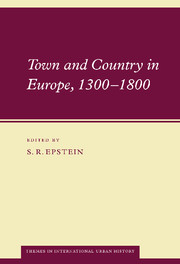Book contents
- Frontmatter
- Contents
- List of figures
- List of tables
- Notes on the contributors
- 1 Introduction. Town and country in Europe, 1300–1800
- 2 Town and country in Sweden, 1450–1650
- 3 Town and country in Holland, 1300–1550
- 4 Town and country in the Dutch Republic, 1550–1800
- 5 Town and country in England, 1300–1570
- 6 Town and country in England, 1570–1750
- 7 Town and country in the Polish Commonwealth, 1350–1650
- 8 Town and country in the Austrian and Czech lands, 1450–1800
- 9 Town and country in Germany, 1350–1600
- 10 Town and country in Switzerland, 1450–1750
- 11 Town and country in France, 1550–1750
- 12 Town and country in Castile, 1400–1650
- 13 Town and country in central and northern Italy, 1400–1800
- 14 Town and country in the kingdom of Naples, 1500–1800
- Index
9 - Town and country in Germany, 1350–1600
Published online by Cambridge University Press: 09 November 2009
- Frontmatter
- Contents
- List of figures
- List of tables
- Notes on the contributors
- 1 Introduction. Town and country in Europe, 1300–1800
- 2 Town and country in Sweden, 1450–1650
- 3 Town and country in Holland, 1300–1550
- 4 Town and country in the Dutch Republic, 1550–1800
- 5 Town and country in England, 1300–1570
- 6 Town and country in England, 1570–1750
- 7 Town and country in the Polish Commonwealth, 1350–1650
- 8 Town and country in the Austrian and Czech lands, 1450–1800
- 9 Town and country in Germany, 1350–1600
- 10 Town and country in Switzerland, 1450–1750
- 11 Town and country in France, 1550–1750
- 12 Town and country in Castile, 1400–1650
- 13 Town and country in central and northern Italy, 1400–1800
- 14 Town and country in the kingdom of Naples, 1500–1800
- Index
Summary
Introduction
The pattern of town–country relations in the German-speaking lands from the Alps to the North Sea from the fourteenth to the seventeenth centuries displayed a greater variety than in any other part of Europe. It ranged from fully-fledged city-states in the Swiss Confederation, sovereign principalities in their own right, to spheres of regional economic influence in the southern Low Countries, where the leading cities dominated the economy of their hinterlands without achieving exclusive jurisdiction. Across this spectrum the cities of Germany were located at intermediate points. Some, such as Nuremberg, attempted to acquire land which would directly serve their commercial interests as a source of labour or raw materials; others, such as Augsburg or Cologne, came to dominate the economies of their hinterlands in the organisation of production and distribution without ever amassing a landed territory of any size. Nuremberg was a city-state in all but name; Augsburg and Cologne echoed the regional economic sway exercised by the Flemish cities.
In either dimension, cities were concerned to extend their centrality – whether jurisdictional, political, economic, or social – over their surrounding countryside, in other words to establish a hierarchy of influence or dependence. But it should not be forgotten that relations between town and country were shaped by co-operation between cities as well as by competition. This, too, was a particular feature of the German-speaking lands, reflected in both political and commercial alliances.
- Type
- Chapter
- Information
- Town and Country in Europe, 1300–1800 , pp. 202 - 228Publisher: Cambridge University PressPrint publication year: 2001



